
No, not really. It's just a coincidence that the
#1 social networking outlet went into decline shortly after I joined up. It's also
very much alive, albeit largely irrelevant in the social media landscape, as a music and entertainment platform.
I resisted joining for years, but I finally gave in to peer pressure. While I was connecting with obscure indie metal bands, scandals rocked the platform. It was labelled a "vortex of perversion" after sensationalized stories of teen sex, drugs, and kidnapping surfaced, reinforced by unsavory ads that everyone could see regardless of age and "moral standing." Throw in technical difficulties and the platform quickly hemorrhaged users. If you want, you can read a thorough story
here.
MySpace was displaced by Facebook, and the rest is history.
I'm still not on Facebook. Why? So many reasons, but they can be categorized into two camps: the politics of personal relationships and Facebook's use of my data. I think both are pretty self-explanatory, but I'll elaborate.
The politics of personal relationships requires that I friend people who I don't like or don't really connect with in real life. And then I have to like things that they post like "sitting on the couch with a bag of Doritos watching TV" or "here are 32 pictures of my kid". Some people don't understand the concept of
oversharing. In either case, if I don't play along, I'm a dick. When I see them in person, I then have to explain why I didn't "like" their post or refused their friend request. Makes for some really awkward times. I much prefer to be polite and keep my interactions with them in small doses.
If that makes me seem like a jerk, I'll accept that. But one should bear in my mind, that politeness in uncomfortable situations keeps things civil. Human history is rife with violence. The polite veneer of civility helps us all get along, but it can be exhausting. Do I really need to play this game with people who overshare? Do we really need more drama?
Facebook uses its members' data to make money. Nothing is off limits. It seems like people are just
waking up to this. The counter argument is that you can't something for nothing. Yeah, I get that. I'd pay a reasonable subscription for a social media platform (I already pay for
my website) where I had full control over how my data was used. But nothing sells like
FREE.
I'll spare you the whole fake news crap that surfaced during the last election. Like I want to have a page of lies clogging up my screen.
So why am I considering joining? Because
nearly everyone is on there! That isn't hyperbole: 40 million businesses, 2 billion people. Start up companies (breweries come to mind) forego having websites in favor of a Facebook page due to cost and simplicity. But even mature businesses have a presence on Facebook to drum up interest and will use it to handle their communications.
As an indie author, I need to find ways to reach out to people. Websites and blogs are just islands in the vast sea of the internet. Facebook is a continent. If you don't have some connection, you won't necessarily die, but you won't flourish either. If one person likes something, it shows up in their feed, which their friends see. Some might actually follow up and see what their friend liked. Such is the power of the network.
I've tried two other social media platforms (besides MySpace), but neither compares to the Pangaea of Facebook.
Google+ is fine, but its activity is tepid. Yes, I realize that Google is using my data, but I'm careful about what I share. Also, I haven't had any of the liking pressure. Of course, nearly no one I know uses it. I keep wondering when Alphabet is going to pull the plug on it.
Goodreads is a haven for bookworms. Its defined structure means I don't have to worry about drowning in cat videos. Again, no pressure to like someone's review or update. But maybe that's because I don't have a big network of people I connect with there. That's not to say it doesn't have
issues, but I haven't had a problem avoiding them. It also offers authors a means to self-promote. I haven't taken full advantage of them yet, but plan to once I finish
Gateway to Empire. Maybe that will be enough, but I'm inclined to think not.
But maybe this angst is all for naught. There's
anecdotal evidence that Facebook usage is in decline. By the time I get around to joining it, maybe all of its
issues will have finally caught up to it and send the company down into a death spiral. I don't think so. It's too big to fail, and there aren't any real alternatives. Unless there's an anti-social media movement where we downplay the importance of its role in our lives, I don't see that happening.
So I guess I'd better get ready to like a lot of cat videos and baby pictures.
\_/
DED
 Stross runs Christmas through the Laundry. Who's coming down the chimney? Is it Santa Claus? Heh. If you know Stross's Laundry-verse, you know the answer.
Stross runs Christmas through the Laundry. Who's coming down the chimney? Is it Santa Claus? Heh. If you know Stross's Laundry-verse, you know the answer.

 Cloud Atlas begins in 1850 with Adam Ewing, an American notary voyaging from the Chatham Isles to his home in California. Along the way, Ewing is befriended by a physician, Dr. Goose, who begins to treat him for a rare species of brain parasite... Abruptly, the action jumps to Belgium in 1931, where Robert Frobisher, a disinherited bisexual composer, contrives his way into the household of an infirm maestro who has a beguiling wife and a nubile daughter... From there we jump to the West Coast in the 1970s and a troubled reporter named Luisa Rey, who stumbles upon a web of corporate greed and murder that threatens to claim her life... And onward, with dazzling virtuosity, to an inglorious present-day England; to a Korean superstate of the near future where neocapitalism has run amok; and, finally, to a post-apocalyptic Iron Age Hawaii in the last days of history.
Cloud Atlas begins in 1850 with Adam Ewing, an American notary voyaging from the Chatham Isles to his home in California. Along the way, Ewing is befriended by a physician, Dr. Goose, who begins to treat him for a rare species of brain parasite... Abruptly, the action jumps to Belgium in 1931, where Robert Frobisher, a disinherited bisexual composer, contrives his way into the household of an infirm maestro who has a beguiling wife and a nubile daughter... From there we jump to the West Coast in the 1970s and a troubled reporter named Luisa Rey, who stumbles upon a web of corporate greed and murder that threatens to claim her life... And onward, with dazzling virtuosity, to an inglorious present-day England; to a Korean superstate of the near future where neocapitalism has run amok; and, finally, to a post-apocalyptic Iron Age Hawaii in the last days of history.
 It's been several months since the events in Volume Three transpired. Alana is working as an actor for some kind of lame super hero soap opera, while Marko is a stay-at-home dad. Hazel is a rambunctious toddler. Marko's mom and Izabel the ghost nanny still live with them too. The whole situation is extremely stressful and putting a definite strain on their relationship. There are temptations which cloud their judgement and make them forget that they're a team. Kudos to Vaughn for bringing in an element of everyday life to the story.
It's been several months since the events in Volume Three transpired. Alana is working as an actor for some kind of lame super hero soap opera, while Marko is a stay-at-home dad. Hazel is a rambunctious toddler. Marko's mom and Izabel the ghost nanny still live with them too. The whole situation is extremely stressful and putting a definite strain on their relationship. There are temptations which cloud their judgement and make them forget that they're a team. Kudos to Vaughn for bringing in an element of everyday life to the story.
 At this point in the series, Spider Jerusalem is fully settled in the city he hates, cranking out a column of acerbic wit and caustic insight each week. There are three standalone stories in this volume along with a three-part tale.
At this point in the series, Spider Jerusalem is fully settled in the city he hates, cranking out a column of acerbic wit and caustic insight each week. There are three standalone stories in this volume along with a three-part tale.
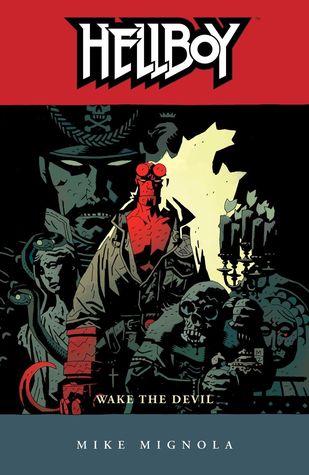 Volume 2 picks up where volume 1 left off. Defrosted WW2 Nazis are striving to build their "vampir sturm" army, but they need resources to build it and Vladimir Giurescu to finish the job. While the resource problem is quickly solved, ol' Vlad's been dead since the war and his body is hard to find. A year later, Hellboy and his fellow field agents from the Bureau of Paranormal Research and Defense (I didn't realize it was located so close to home. I should see if they're hiring.) are sent to Romania to investigate.
Volume 2 picks up where volume 1 left off. Defrosted WW2 Nazis are striving to build their "vampir sturm" army, but they need resources to build it and Vladimir Giurescu to finish the job. While the resource problem is quickly solved, ol' Vlad's been dead since the war and his body is hard to find. A year later, Hellboy and his fellow field agents from the Bureau of Paranormal Research and Defense (I didn't realize it was located so close to home. I should see if they're hiring.) are sent to Romania to investigate.
 So volume two left off with a bit of a cliffhanger. Rather than pick right up where they left off, Vaughn and Staples rewind a few days to show our heroes arriving on Quietus to meet the author of the novel that sparked their relationship. There's a bit of exploration on how people cope with loss. Some depth is added to Marko's mom.
So volume two left off with a bit of a cliffhanger. Rather than pick right up where they left off, Vaughn and Staples rewind a few days to show our heroes arriving on Quietus to meet the author of the novel that sparked their relationship. There's a bit of exploration on how people cope with loss. Some depth is added to Marko's mom.
 When I spotted this book at the Newtown Library annual book sale in the summer of 2017, I was psyched. Here was a chance to read some old favorites and discover other stories that I hadn't read before. I likened it to picking up an album by a band who you only knew by their greatest hits but wanted to dive deeper into their discography. So when October rolled around last year, it seemed the perfect time to re-visit Poe.
When I spotted this book at the Newtown Library annual book sale in the summer of 2017, I was psyched. Here was a chance to read some old favorites and discover other stories that I hadn't read before. I likened it to picking up an album by a band who you only knew by their greatest hits but wanted to dive deeper into their discography. So when October rolled around last year, it seemed the perfect time to re-visit Poe.
 Persepolis: The Story of a Childhood is a graphic memoir (a memoir in graphic novel form) of Marjane Satrapi's childhood years in Tehran, Iran during the late 70s and early 80s. Those old enough to remember—or know their history—will recall that this is the time when the Shah was evicted from Iran and a religious dictatorship took his place, the American embassy was captured and 52 people were held hostage for over a year, and Iran went to war with Iraq. I'm about Satrapi's age, so I recall those events (from a safe distance) and coming to believe that Iran was ground zero for chaos in the Middle East and the bastion of "Death to America!" sentiment. Persepolis is Marjane Satrapi's attempt to relate what living there was like.
Persepolis: The Story of a Childhood is a graphic memoir (a memoir in graphic novel form) of Marjane Satrapi's childhood years in Tehran, Iran during the late 70s and early 80s. Those old enough to remember—or know their history—will recall that this is the time when the Shah was evicted from Iran and a religious dictatorship took his place, the American embassy was captured and 52 people were held hostage for over a year, and Iran went to war with Iraq. I'm about Satrapi's age, so I recall those events (from a safe distance) and coming to believe that Iran was ground zero for chaos in the Middle East and the bastion of "Death to America!" sentiment. Persepolis is Marjane Satrapi's attempt to relate what living there was like.
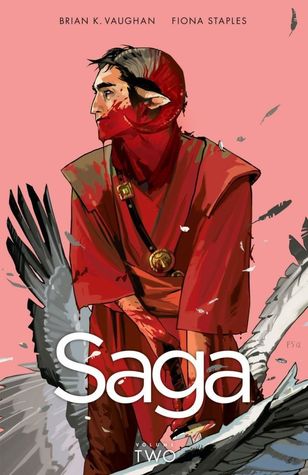 So if you haven't read volume 1, this review could be a bit spoiler-ish.
So if you haven't read volume 1, this review could be a bit spoiler-ish. 1999: NASA astronaut Nigel Walmsley is sent on a mission to intercept a rogue asteroid on a collision course with Earth. Ordered to destroy the comet, he instead discovers that it is actually the shell of a derelict space probe - a wreck with just enough power to emit a single electronic signal...
1999: NASA astronaut Nigel Walmsley is sent on a mission to intercept a rogue asteroid on a collision course with Earth. Ordered to destroy the comet, he instead discovers that it is actually the shell of a derelict space probe - a wreck with just enough power to emit a single electronic signal...
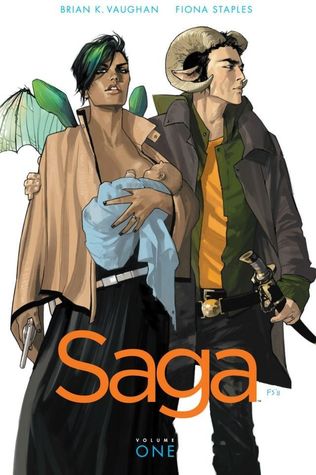 Goodreads has been recommending this one to me for some time, and good many of the people I follow there gushed with praise. My local library had a copy so I figured that I'd finally pick it up. I burned through it in two days. I only put it down because I had to sleep. Then I read it again.
Goodreads has been recommending this one to me for some time, and good many of the people I follow there gushed with praise. My local library had a copy so I figured that I'd finally pick it up. I burned through it in two days. I only put it down because I had to sleep. Then I read it again.
 When I picked up this graphic novel from the library, I had no idea who
When I picked up this graphic novel from the library, I had no idea who 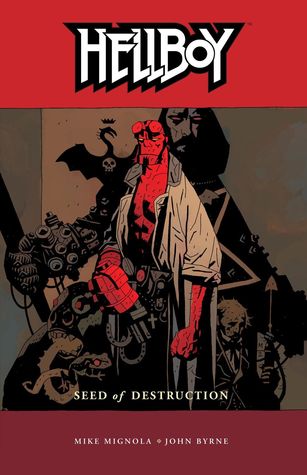 I saw the
I saw the 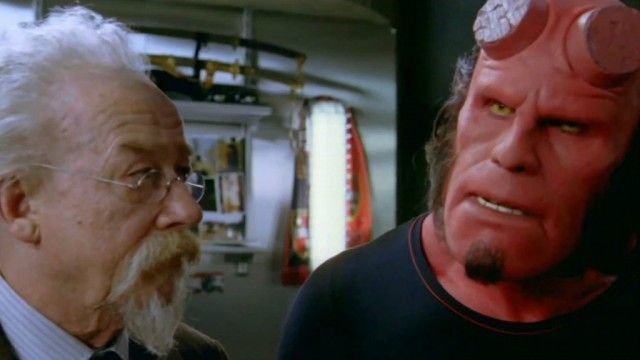 Hellboy's relationships with other characters is largely undeveloped in this issue of the comic. Other than a little background on Abe and Liz, we really don't get any reason why Hellboy cares about them. And Professor Bruttenholm? Forget it. In the movie, Perlman and Hurt really develop the relationship. Here, it's over before it starts with nary a thought or feeling. I have to imagine that these relationships and characters were expounded upon in subsequent issues.
Hellboy's relationships with other characters is largely undeveloped in this issue of the comic. Other than a little background on Abe and Liz, we really don't get any reason why Hellboy cares about them. And Professor Bruttenholm? Forget it. In the movie, Perlman and Hurt really develop the relationship. Here, it's over before it starts with nary a thought or feeling. I have to imagine that these relationships and characters were expounded upon in subsequent issues.
 Four hundred years from now mankind is strung out across a region of interstellar space inherited from an ancient civilization discovered on Mars. The colonies are linked together by the occasional sublight colony ship voyages and hyperspatial data-casting. Human consciousness is digitally freighted between the stars and downloaded into bodies as a matter of course.
Four hundred years from now mankind is strung out across a region of interstellar space inherited from an ancient civilization discovered on Mars. The colonies are linked together by the occasional sublight colony ship voyages and hyperspatial data-casting. Human consciousness is digitally freighted between the stars and downloaded into bodies as a matter of course.
 This is the story of mankind clawing for survival, of mankind on the edge. The world outside has grown unkind, the view of it limited, talk of it forbidden. But there are always those who hope, who dream. These are the dangerous people, the residents who infect others with their optimism. Their punishment is simple. They are given the very thing they profess to want: They are allowed outside.
This is the story of mankind clawing for survival, of mankind on the edge. The world outside has grown unkind, the view of it limited, talk of it forbidden. But there are always those who hope, who dream. These are the dangerous people, the residents who infect others with their optimism. Their punishment is simple. They are given the very thing they profess to want: They are allowed outside.
 This book contains the origin stories for Fafhrd and the Grey Mouser, the popular pair of adventurers from the mind of Fritz Leiber.
This book contains the origin stories for Fafhrd and the Grey Mouser, the popular pair of adventurers from the mind of Fritz Leiber.
 The planet is called Banshee. The air is unbreathable, the water is poisonous. It is home to the most implacable enemies that humanity, in all its interstellar expansion, has ever encountered.
The planet is called Banshee. The air is unbreathable, the water is poisonous. It is home to the most implacable enemies that humanity, in all its interstellar expansion, has ever encountered.
 Newer editions have better covers. This was the 1987 cover, which is the one I own.
Newer editions have better covers. This was the 1987 cover, which is the one I own.

 Physicist Dennis Nuel is the first human to probe the strange realms called anomaly worlds: alternate universes where the laws of science are unpredictably changed. But the world Dennis discovers seems almost like our own—with one perplexing difference. To his astonishment, he’s hailed as a wizard, meets a beautiful woman with strange powers, and finds himself fighting a mysterious warlord as he struggles to solve the riddle of this baffling world.
Physicist Dennis Nuel is the first human to probe the strange realms called anomaly worlds: alternate universes where the laws of science are unpredictably changed. But the world Dennis discovers seems almost like our own—with one perplexing difference. To his astonishment, he’s hailed as a wizard, meets a beautiful woman with strange powers, and finds himself fighting a mysterious warlord as he struggles to solve the riddle of this baffling world.
 2.5 stars.
2.5 stars.
 As the Empire reels from its critical defeats at the Battle of Endor, the Rebel Alliance—now a fledgling New Republic—presses its advantage by hunting down the enemy’s scattered forces before they can regroup and retaliate. But above the remote planet Akiva, an ominous show of the enemy’s strength is unfolding. Out on a lone reconnaissance mission, pilot Wedge Antilles watches Imperial Star Destroyers gather like birds of prey circling for a kill, but he’s taken captive before he can report back to the New Republic leaders.
As the Empire reels from its critical defeats at the Battle of Endor, the Rebel Alliance—now a fledgling New Republic—presses its advantage by hunting down the enemy’s scattered forces before they can regroup and retaliate. But above the remote planet Akiva, an ominous show of the enemy’s strength is unfolding. Out on a lone reconnaissance mission, pilot Wedge Antilles watches Imperial Star Destroyers gather like birds of prey circling for a kill, but he’s taken captive before he can report back to the New Republic leaders.
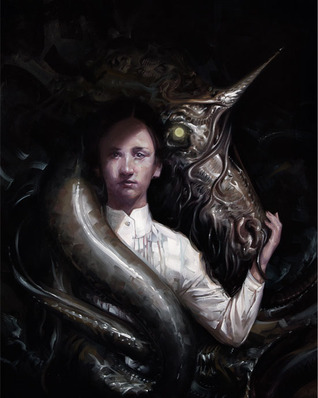 If this story had come out ten years earlier, I would never have let my daughter play with those MyLittlePony™ things. But she grew to love giraffes instead of horses or unicorns, so I suppose that worry would've been for naught anyway. At least until Stross pens something horrific about those ungainly ungulates.
If this story had come out ten years earlier, I would never have let my daughter play with those MyLittlePony™ things. But she grew to love giraffes instead of horses or unicorns, so I suppose that worry would've been for naught anyway. At least until Stross pens something horrific about those ungainly ungulates.
 We are not alone.
We are not alone.